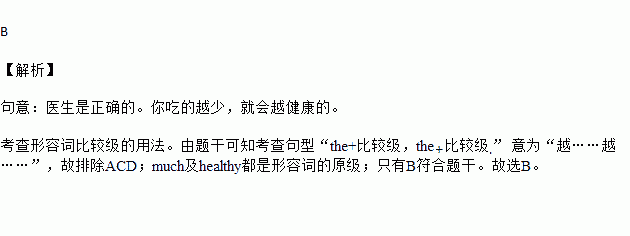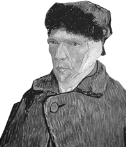题目内容
The doctor’s advice is right. The ________you eat, the ________you will be.
A.much; healthy B.less; healthier C.much; healthier D.less; healthy
 名校课堂系列答案
名校课堂系列答案阅读下面短文, 根据短文内容完成表格中所缺信息, 每空一词。
Going green is easier than you think. There are little things you can do every day to help reduce greenhouse gases and make a meaningful influence on the environment. Here are things you can do to help save the earth.
Pay attention to how you use water. The little things can make a big difference. Every time you turn off the water while brushing your teeth, you' re doing something good. Try drinking tap water instead of bottled water, so you don't waste the bottles as well. Wash your clothes in cold water when you can.
Leave your car at home. If you can stay off the road just two days a week, you'll reduce greenhouse gas emissions(排放)by an average of 1,590 pounds per year. You can go to the post office, supermarket and shoe repair place in one trip. It will save your gas and time.
Walk or ride your bike to work, school and anywhere you can. You can reduce greenhouse gases while burning some calories and improving your health.
Recycle. You can help reduce waste just by putting the cans into different bins. If you're trying to choose between two products, pick the one with the least packaging(包装)
Drive smarter. Slow down—driving 60 miles (96 km) per hour instead of 70 mph, the highway will exactly save you up 4 miles (6 km) per gallon(加仑).
Taking care of the earth is not just a duty—it's a privilege(荣幸)
1. on Going Green
2. | Going green is easier than you think. You can help save the earth by doing little things. | |
Main body | Pay attention to how to use water | ? Turn off the water while brushing your 3.. ? Drink tap water 4. of bottled water. ? Wash your clothes in cold water. |
Leave your car at home | 5. off the roads can reduce gas emissions. ? Travelling to some places in one trip will save your gas and time. | |
Go anywhere on 6. or by bike if possible | ? Reduce greenhouse gases by walking or riding a bike. ? Burn some calories and make you 7.. | |
Recycle | ? Put the cans into different bins. ? Pick the products 8. the least packaging. | |
Drive smarter | ? Drive at the 9. of 96 km per hour on the highway | |
Conclusion | Taking care of the earth in not only a duty but 10. a privilege. |


